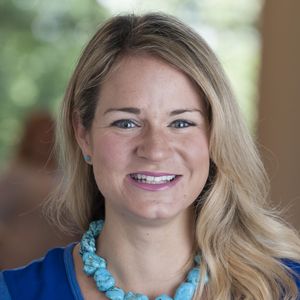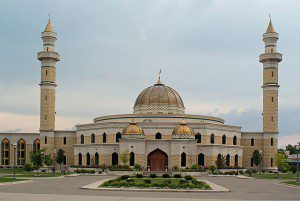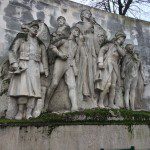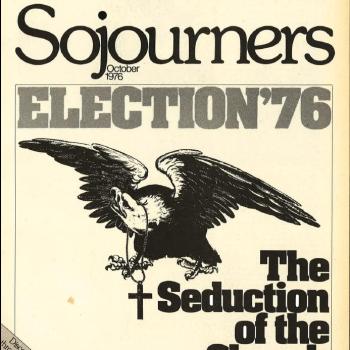Today I’m pleased to introduce Anxious Bench readers to my colleague Amy Poppinga. An expert on Islamic studies, Amy teaches an introductory course at Bethel University on the History of Islam, as well as upper-division classes on Muslim Women in History and the Modern Middle East. She has also played a key role in helping Bethel pave the way for evangelical universities to participate in interfaith dialogue and service. Over our Christmas break, she was kind enough to answer a few questions about her experience as a Christian historian of Islam.
How did you discover your interest in Islamic studies?

As someone who spent the majority of her college career in an exclusively Christian environment, I did not have much exposure to broader religious diversity. That changed quickly when I became a public high school teacher — primarily through my interactions with my students, but also my colleagues. One of the first (and largest) mosques established in Minnesota was only a few miles from the school. We had a number of Muslim students from a variety of different backgrounds. I realized that while I had been trained in college to engage cultural and ethnic diversity, I was clueless when it came to trying to connect with students of different faith traditions. As a Christian, but also as a history teacher, I felt convicted that I had a responsibility to increase my knowledge of Islam, so that I would be better able to connect with these students. I would eventually pursue a graduate degree in Islamic Studies with the intention of returning to work in the public schools in the position of a cultural liaison, but my path changed and I began to teach at the college level instead.
How unusual is it for a professor at a Christian university like Bethel to study Islam?
I began teaching at Bethel in 2005, and at the time I would say it was unusual. As I surveyed other Christian colleges to find similar courses, I did not discover anyone teaching Islamic studies from a historical perspective. Rather, if I found anything at all, it was often a comparative religion course or something related to cross-cultural missions. This was not how I had been trained and it was not the perspective I was coming from. I don’t want to sound too judgmental but much of what I observed just seemed to reinforce an “us” vs. “them” narrative, and I wanted to make sure I was doing something different. At a school the size of Bethel, it is very unusual to have a historian of Islam, but I think it is a strategic fit.
What challenges or opportunities come from being a Christian historian of Islam?
As a scholar who doesn’t hide her Christian identity, I can feel like an outsider in a field that is dominated by Muslim authors and scholars. Within my own community, there have been times when I have been perceived as an apologist for Islam, or concerns have been expressed that my teaching may be leading students astray. These equally frustrate me, but the comfort always comes in the encouragement I also receive from both communities. I have also more intentionally connected with my own colleagues and individuals at other schools who, though they may not be studying Islam, are invested in interfaith education and engagement.
How has studying Islam shaped your own religious faith and practice?
Studying Islam, and more specifically, having professional and personal relationships with Muslims, has profoundly shaped my Christian commitment, though not for the reasons I think one might initially assume. One of the challenges I consistently give to students is not to hold others accountable to a different set of rules than the ones we choose to follow. As my relationships with the Muslim community grow, I feel consistently convicted to make sure that who I am, and what I say does not change, regardless of who is in the audience. What I say about Islam needs to remain based in sound, academic content, and should not be manipulated to alleviate Christian insecurity.
Also, I suggest to my students that we cannot interrogate others of different belief systems with questions we are not willing to ask ourselves. While I want them to be equipped with knowledge, I also want them to become more confident in their own beliefs. This is not achieved through de-bunking or proving another religion wrong. Instead, asking ourselves the same tough questions we ask of Islam allows us to engage in some healthy self-reflection. I am never more proud of students than when, after coming to the realization that we do and say a lot of things without knowing why, they seek to find answers in Scripture or other sources. They realize that our answers do not mean much if they fail us once we move them beyond the confines of our own Christian tribe.
I also tell students that I am learning with them. There is no question I will ask them to consider that I am not wrestling with myself. While I know I just said we need to continuously seek answers in our sources, what we often conclude is that the most beautiful and real parts of our religion fall into the category of faith, and often can’t be described or fully understood. This is a good conclusion to come to, as long as we are willing to allow Muslims to regard their religious experience in the same way.
Religious studies is an multi-disciplinary field. As a historian, what’s distinctive about your approach to the study of religion? What have you learned from scholars of religion rooted in other disciplines?
My teaching and research are at their best when I incorporate aspects of anthropology, sociology, and even psychology into my curriculum. It helps me to better reach students from a variety of majors in my general education courses. However, I think starting with historical framework is essential. History allows the subject matter to speak first. Over the course of the past few years I believe that I have become a more skilled historian, and I spend significant time explaining to students how historians approach questions. The use of history helps to lay a foundation to tackle difficult subjects. Time and again, learning the roots of Islamic history changes the way students view Islam today. I have seen (and read) how students become more compassionate and understanding. They demonstrate respect. They start to recognize that September 11th cannot be a starting point for understanding Islam.

“Good” history allows me to combat stereotypes and clear up inaccuracies and misinformation. It’s pretty powerful to tell a Sunday school class in rural South Dakota that one of the first mosques in the United States was established in Ross, North Dakota… in 1930! One student expressed that discovering Muslims had been in her hometown of Cedar Rapids, Iowa at least 20 years before her own ancestors challenged her often-subconscious views of what it means to be “American.” Learning about the long and vibrant history of immigrant Muslim communities, dating back to the 18th century, and possibly earlier, demonstrates that Muslims are not “new here.” The more I lean into the tools of my discipline, the more effective a Christian educator I become. When we begin to not only elevate, but celebrate, the lives and history of those we consider the “other,” we are doing redemptive work.













